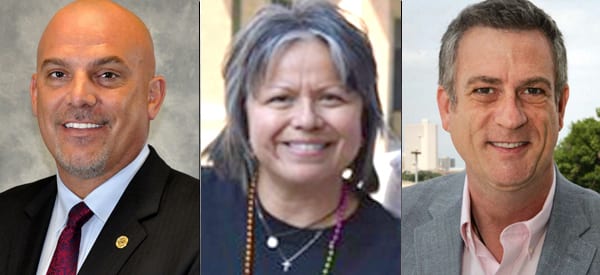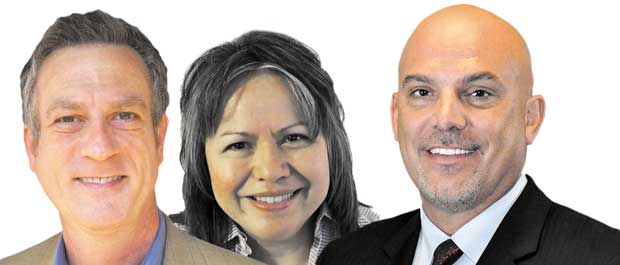
From left: FWISD Superintendent Kent Scribner, LGBTQ S.A.V.E.S. President Sharon Herrera and Fairness Fort Worth President David Mack Henderson
Tammye Nash | Managing Editor
nash@dallasvoice.com
Fort Worth Independent School District Superintendent Kent Scribner this week announced that he has signed a set of detailed guidelines designed to protect transgender students by clarifying the district’s existing anti-bullying and anti-discrimination policies.
Clint Bond, FWISD’s external and emergency communications director, said Scribner made the announcement at the Tuesday night, April 26 meeting of the district’s Board of Trustees. “He just wanted the board to know that he had signed these comprehensive guidelines,” Bond said.
In 2011, the district, then under the leadership of interim Superintendent Walter Dansby, the FWISD school board expanded the district’s anti-harassment and anti-bullying policies to include protections based on gender identity and gender expression. Protections based on sexual orientation were already included.
Bond said the new guidelines were designed to give “more specificity” to existing policy.
Sharon Herrera, founder and president of LGBTQ S.A.V.E.S, on Wednesday, April 27, praised Scribner for issuing the guidelines, saying the superintendent “is indeed walking his talk. He genuinely means all students, preparing them for college, career and community leadership.”
She added, “I applaud FWISD and anticipate that along with these guidelines, there will be training.”
LGBTQ S.A.V.E.S is an organization created to “foster the well-being of LGBTQ students and staff in the public schools of Fort Worth and surrounding communities by promoting safe, egalitarian and supportive environments and policies, Herrera explained. She said the organization works to provide LGBTQ students and their families with resources related to LGBTQ issues and safe spaces for social and personal development.
Herrera noted that her organization continues to hear reports from local districts of bullying, not only from students but also adults, including teachers and administrators. “Until our LGBTQ youth can feel safe on their school campuses, our work is not done,” she said.
Fairness Fort Worth President David Mack Henderson said Wednesday that he and his organization “applaud Dr. Scribner and his staff for working to insure our most vulnerable students have both equal protection and opportunity.”
Henderson continued, “My read is that FWISD is making their proactive, inclusive position clear. They not only intend to comply with federal Title IX guidelines, they’ve elucidated best practices to accomplish just that. The beauty of these guidelines is that one group of students isn’t being compromised to help another. They’ve actually found a means to assure privacy for every student, regardless of their views, while still providing equal access.
“These guidelines serve as an excellent template for other schools seeking a reasonable solution to this issue,” Henderson continued. “My hope is that other school districts quickly implement similar guidelines so we can all get on with the business of educating our kids.”
FWISD’s expanded policy notes that the district “prohibits discrimination, including harassment, against any student on the basis of race, color, religion, gender, sexual orientation, gender identity and expression, national origin, disability, or any other basis prohibited by law. The district prohibits dating violence, as defined by this policy. Retaliation against anyone involved in the complaint process is a violation of district policy and is prohibited.
The guidelines — which, Henderson pointed out, can be put into force with just the superintendent’s signature whereas a policy change requires a vote by the board of trustees — reiterates a number of points related to the nondiscrimination policy while elaborating on protections for transgender students.
The guidelines “seek to ensure that no student experiences an unsafe or unwelcome learning environment,” while acknowledging “Transgender youth may experience additional challenges at school” and that “support from classmates and school personnel may help transgender students who otherwise feel ostracized or disengaged.”
The eight-page guideline package presented to the board pointed to “growing support for research indicating that enforcing fixed notions of what it means to be a boy or a girl may have negative effects on children,” especially in a learning environment. The school district is implementing the guidelines, the statement noted, “to provide direction for personnel to address issues that may arise concerning the needs of and challenges facing transgender students, and to foster an inclusive and productive learning environment for all students.”
The guidelines include an extensive list of terms and definitions regarding transgender people and issues, but also points out that “not all people will fit a particular definition or pattern. Instead of focusing on what definition applies to a particular person, school personnel are required to show respect for the student’s desires and wishes to the extent practical so as to foster a productive educational process for all.”
The guidelines also lay out specific reporting procedures in the event of complaints, and names a specific person — Employee Relations Director Rufino Mendoza — as the Title IX coordinator for the district and the person to whom complaints should be reported.
The guidelines require faculty and staff to “acknowledge the gender identity that each student consistently and uniformly asserts,” without need of a medical or mental health diagnosis or treatment. Campus counselors are designated as the allies for students who need or want to discuss gender identity issues.
The guidelines also require district personnel to use a student’s preferred name and pronouns unless otherwise required by law for record keeping purposes. “Continued intentional misuse of a student’s new name and pronouns coupled with reference to the student’s former gender,” the guidelines state, “undermines the student’s desires and is contrary to the district’s goal of treating students with dignity and respect.”
The guidelines stress that a student’s name and gender on official records can be changed only with a legal court order. But no such order is necessary for personnel to use the student’s preferred name and pronouns and gender identity.
If you don’t know how the student prefers to be identified, ask them in private, the guidelines direct. And students have the right to keep their actual or perceived gender identity and expression private, including from their parents or guardians. Only share such information if the student gives his or her permission, and that goes for sharing the information with parents or guardians, too, the guidelines say.
“Transitioning is a very private matter,” the guidelines warn. “Students may choose whether or not to have their parents participate in this process. In fact, notifying a parent or guardian carries risks for the students in some cases,” so school personnel need to talk to the student about what to tell the parents.
Regarding restroom facilities, the guidelines say, “If other students feel uncomfortable sharing a restroom with a transgender student or if a student has a need or desire for increased privacy, the school must allow the student(s) access to a single stall restroom, gender neutral restroom or the opportunity to visit the facility when other students are not present. A single user restroom, however, must not be given as the only option for transgender students who need or desire increased privacy.”
The schools are required to make similar accommodations for locker rooms, and the guidelines prohibit school personnel from using dress codes to prevent a transgender student from living full time “in the role consistent with his or her gender identity.”
The new guidelines also require schools to give all students, including transgender students “equitable access to [all] activities and programs,” including cheerleading, homecoming, prom and sports. But the guidelines acknowledge that “UIL may have ultimate authority to determine the team on which a student can participate in league play.”
That, Henderson said, remains a problem because of rules recently adopted by the University Interscholastic League, which governs intermural sports in Texas public schools, which requires students’ gender be determined for the purpose of such sports teams based on their physical gender at birth.
“The new UIL rules still leaves districts in the untenable position of either complying with Title IX for federal funding or with the sports authority to qualify for team play,” Henderson said. “The UIL rule is clearly in violation of federal law. The question remaining is will UIL and UT, their host organization, force Texas schools and trans students to pay the price for UIL’s illegal rule?”
He concluded, “When we permit loud voices to err on the side of fear, the result is hysteria. I say we don’t let them play that game with us anymore. We’re done reacting to every nonsensical cry of social Armageddon.
“These are our lives, our families and our children, too,” Henderson declared, “and we get to set the tone and the narrative from now on, period.”
For the complete text of the new guidelines, go here.

